初中英语语法之反义疑问句
反义疑问句 初中英语 语法
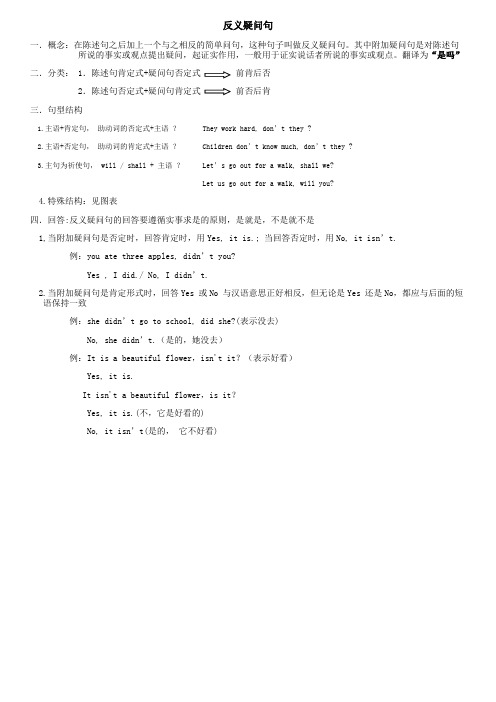
反义疑问句一.概念:在陈述句之后加上一个与之相反的简单问句,这种句子叫做反义疑问句。
其中附加疑问句是对陈述句所说的事实或观点提出疑问,起证实作用,一般用于证实说话者所说的事实或观点。
翻译为“是吗”二.分类: 1.陈述句肯定式+疑问句否定式前肯后否2.陈述句否定式+疑问句肯定式前否后肯三.句型结构1.主语+肯定句,助动词的否定式+主语?They work hard, don’t they ?2.主语+否定句,助动词的肯定式+主语? Children don’t know much, don’t they ?3.主句为祈使句, will / shall + 主语? Let’s go out for a walk, shall we?Let us go out for a walk, will you?4.特殊结构:见图表四.回答:反义疑问句的回答要遵循实事求是的原则,是就是,不是就不是1,当附加疑问句是否定时,回答肯定时,用Yes, it is.; 当回答否定时,用No, it isn’t.例:you ate three apples, didn’t you?Yes , I did./ No, I didn’t.2.当附加疑问句是肯定形式时,回答Yes 或No 与汉语意思正好相反,但无论是Yes 还是No,都应与后面的短语保持一致例:she didn’t go to school, did she?(表示没去)No, she didn’t.(是的,她没去)例:It is a beautiful flower,isn't it?(表示好看)Yes, it is.It isn't a beautiful flower,is it?Yes, it is.(不,它是好看的)No, it isn’t(是的,它不好看)。
初中英语反义疑问句的用法归纳

初中英语反义疑问句的用法归纳反义疑问句【反义疑问句】(一)概念:反意疑问句是由陈述句和附在其后的附加疑问句组成。
其中附加疑问句是对XXX所说的事实或观点提出疑问,起证实作用,一般用于证实说话者所说的事实或观点。
(二)要点注意:1、反意疑问句前后两部分谓语应是:“肯定陈述+否定疑问”或“否定陈述+肯定疑问”。
2、简略问句如果是否定式:not应与be,do,will等系动词、助动词、情态动词缩写。
3、简略问句的主语不用名词,应用人称代词。
4、陈述部分含“XXX”时,是否定句。
(三)用法:1)陈述部分I am时,疑问部分要用aren't I.I'm as tall as your sister,aren't I?(我和你姐姐一样高,对吗?)2)XXX说局部用no, nothing, nobody, never, few, little, seldom, hardly等否认寄义的词时,疑问局部用肯定含义。
如:The old man made no answer, did he?Jim is never late for school, is he?3)XXX说局部有神态动词have to+v. (had to + v.),疑问局部经常使用don't +主语(didn't +主语)。
We have to get there at eight tomorrow, don't we?used to,疑问局部用didn't +主语或usedn't +主语。
He used to take pictures there, didn't he? / usedn't he?had better(最好)+ v.疑问句部分用hadn't you?You'd better read it by yourself, hadn't you?4)陈说局部有would rather(宁肯、宁肯)+v.,疑问局部多用XXX主语。
初中英语语法之反义疑问句
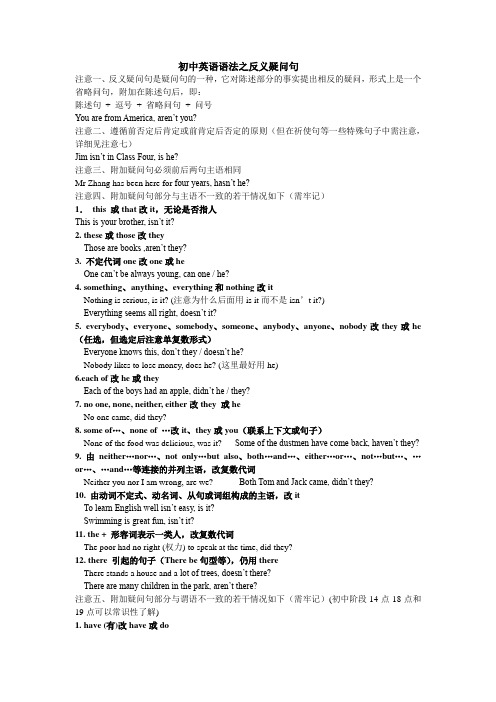
初中英语语法之反义疑问句注意一、反义疑问句是疑问句的一种,它对陈述部分的事实提出相反的疑问,形式上是一个省略问句,附加在陈述句后,即:陈述句+ 逗号+ 省略问句+ 问号Y ou are from America, aren’t you?注意二、遵循前否定后肯定或前肯定后否定的原则(但在祈使句等一些特殊句子中需注意,详细见注意七)Jim isn’t in Class Four, is he?注意三、附加疑问句必须前后两句主语相同Mr Zhang has been here for four years, hasn’t he?注意四、附加疑问句部分与主语不一致的若干情况如下(需牢记)1.this 或that改it,无论是否指人This is your brother, isn’t it?2. these或those改theyThose are books ,aren’t they?3. 不定代词one改one或heOne can’t be always young, can one / he?4. something、anything、everything和nothing改itNothing is serious, is it? (注意为什么后面用is it而不是isn’t it?)Everything seems all right, doesn’t it?5. everybody、everyone、somebody、someone、anybody、anyone、nobody改they或he (任选,但选定后注意单复数形式)Everyone knows this, don’t they / doesn’t he?Nobody likes to lose money, does he? (这里最好用he)6.each of改he或theyEach of the boys had an apple, didn’t he / they?7. no one, none, neither, either改they 或heNo one came, did they?8. some of…、none of …改it、they或you(联系上下文或句子)None of the food was delicious, was it? Some of the dustmen have come back, haven’t they?9. 由neither…nor…、not only…but also、both…and…、either…or…、not…but…、…or…、…and…等连接的并列主语,改复数代词Neither you nor I am wrong, are we? Both Tom and Jack came, didn’t they?10. 由动词不定式、动名词、从句或词组构成的主语,改itTo learn English well isn’t easy, is it?Swimming is great fun, isn’t it?11. the + 形容词表示一类人,改复数代词The poor had no right (权力) to speak at the time, did they?12. there 引起的句子(There be句型等),仍用thereThere stands a house and a lot of trees, doesn’t there?There are many children in the park, aren’t there?注意五、附加疑问句部分与谓语不一致的若干情况如下(需牢记)(初中阶段14点18点和19点可以常识性了解)1. have (有)改have或doMary has two brothers, doesn’t she / hasn’t she?2. have (有)必须与陈述部分一致He hasn’t a lot of time, h as he?Miss Green doesn’t have any money in her pocket, does she?3. have不做“有”解释,必须用doThey all have a good time, don’t they?4. have to用do或haveWe have to get up early, don’t we / haven’t we?5. have got to用haveWe have got to answer all the questi ons, haven’t we?6. had better用should或hadWe had better go right now, shouldn’t we / hadn’t we?7. can’t(不可能,表示推测)根据can’t或的动词选择相应的形式He can’t be a doctor, is he? The workers can’t have finished their work, have they?8. may 用may + 主语+ not (英语中不用mayn’t)They may be here next week, may they not?9. must(必须)用needn’tY ou must do it today, needn’t you?10. must(应该)用mustn’tI must study hard, mustn’t I?11. mustn’t用must或mayY ou mustn’t talk like that, must you? We mustn’t stay here any lo nger, must we?12. “must be”对现在情况进行推测作一般现在时或现在进行时的附加疑问句进行处理2 反义疑问句He must be happy, isn’t he? He must be working hard at the office, isn’t he?must表示推测时,也有用mustn’t的He must have been working very hard, mustn’t he?Y ou must have told Mr W ang the secret, mustn’t you?13. “must + 完成时”表示对过去情况的推测,作一般过去时附加疑问句处理He must have come yesterday, didn’t he? Y ou must have seen the play last week, didn’t you?14. “must + 完成时”用来推测过去的动作持续到现在按现在完成时的附加疑问句来处理Y ou must have studied English for years, haven’t you?He must have lived here for at least ten years, hasn’t he?14. 实义动词need和dear用doHe needs help, doesn’t he? I have never dared to ask him, have I?15. 情态动词need和dear用need和dearHe dare not say so, dare he? We need not do it again, need we?16. needn’t 用need或mustY ou needn’t go yet, need you? He needn’t do that, must he?17. “would rather + 动词原形”和“would like to + 动词原形”用wouldn’tHe would rather read the text ten times than recite it, wouldn’t he?Y ou’d like to have some bananas, wouldn’t you?18. “ought to + 动词原形”用oughtn’t 或shouldn’tThe child ought to be punished, oughtn’t he?We ought to go there, shouldn’t we?19. “used to + 动词原形”用“didn’t + 主语”或“usedn’t + 主语”或“used + 主语+ not”He used to live in Lon don, usedn’t he / didn’t he?He used to play football when he was a child , used he not?注意六、句子中有seldom, hardly, no, not, never, few, little, nothing, nobody, nowhere等是否定句,附加疑问部分必须采用肯定形式Nobody phoned while I was out, did they?He is hardly able to swim, is he? There is little ink in your pen, is there?no one, nobody, none, nothing, neither等作动词的宾语时,附加疑问部分一般采用肯定形式(也偶尔用否定形式)He has nothing to say, does(n’t) he? Y ou got nothing from him, did(n’t) you?注意七、一些特殊句型的附加疑问句1. I am…改aren’t II am your friend, aren’t I?2. I wish to do sth或I wish I …改may II wish to go home, may I? I wish I were you, may I?3. 主从复合句,与主句的主谓语保持一致He says that I did it, doesn’t he?David wouldn’t go there if it rained, would he?4. 并列句,与邻近的分句保持一致Mary is a nice girl, but she had one short-coming, hadn’t she?5. 表示邀请,请求的祈使句,附加疑问部分用will you或won’t you或would you等,一般只要记住will you就可以了,不遵循前否定后肯定或前肯定后否定的原则Come here, will you? Turn off the light, will you? Do sit down, will you?6. 表示告诉别人做某事的祈使句,用will you、can you、would you或can’t you、won’t youStop talking, can you? Write down the new words, will you / won’t you?7. 否定的祈使句用will you或can youDon’t make a noise, will / can you?8. Let me …用will you 或may ILet me help you, may I? Let me do it, will you?9. Let’s …表示建议包括听话人在内,用shall weLet’s go for a walk, shall we?10. let us …表示允许,不包括听话人在内,用will youLet us do it by ourselves, will you?11. Let接第三人称宾语时用will youLet him come in, will you?12. Let’s not …用OK或all rightLet’s not go to the party, OK / all right?13. 感叹句用一般现在时b e的形式(故事中用一般过去时b e的形式)What fine weather, isn’t it?How clever the boy is, isn’t he?How hard she works, isn’t she?。
初中英语反义疑问句详细讲解整合

反义疑问句一、英文中的反意疑问句。
1、什么是反意疑问句英语中,反意疑问句是由陈述句与附在其后的附加疑问句组成。
其中附加疑问句是对陈述句所说的事实或观点提出疑问,起证实作用,一般用于证实说话者所说的事实或观点。
(表示说话者对某事有一定看法,但又不完全确定,需要对方加以证实。
)翻译为“是吗”2.反意疑问句的回答,回答时,如果情况属实,用加上反问句的倒装肯定句;若果情况不属实,则用加上反问句的倒装否定句。
例如, ’t ?情况属实:, I .?情况不属实:, I’t.注意事项:附加问句的主语应与陈述句的主语保持一致,且只能用人称代词替代。
如:Beijing, 't ?你来自北京,是不是?'t , ?一年级的学生不去公园了,是吗?二、反意疑问句中问句部分的动词与陈述部分的动词在语气上成相反的对应关系,即:肯定+否定?否定+肯定?如:’t , ? 你不能做它,是吗?, ’t ?他们开会迟到了,是吗?三.当陈述句中含有动词,助动词,或是情态动词时,反问句部分由这些词加上主语人称代词构成,动词包括:, , , ,助动词有:, , , (用在完成时), (用在完成时)等情态动词有:, , , , , , , ,例如:a ,’t ?她是一个可爱的女孩,是吗?, ’t?他要回家了,是吗?’t , ?她不喜欢吃爆米花,是吗?’t , ?小宝宝睡得不早,是吗?注意:,’t? (不能用’t ?)他每天在家吃晚饭,是吗?, ’t ? (不能用’t ?)他们已经知道那事情了,是吗?四.当陈述句中只含有行为动词时,若动词加了s,就用, 若动词为原形,就用,动词为过去式,则用,例如:, ’t?你上周打扫了你的房间,是吗?, ’t?你父亲电脑技术很好,是吗?, ’t ?你今天看起来很高兴,是吗?五.(1)反意疑问句的陈述部分带有, , , , ,, , , , , , 等否定意义的词时,问句部分用肯定式。
如:① a , ?(不用’t ?) 她从不说谎,是吗?②, ?(不用’t ?) 他几乎不迟到,是吗?3. I , ?4. , ?5. , ?(2).含有否定含义的词在陈述部分作动词的宾语时,其反意疑问句用肯定结构,也可以用否定结构。
初中英语语法:反意疑问句
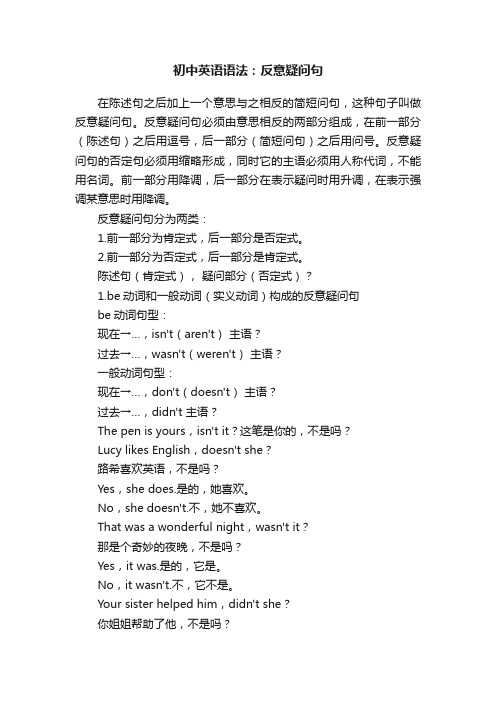
初中英语语法:反意疑问句在陈述句之后加上一个意思与之相反的简短问句,这种句子叫做反意疑问句。
反意疑问句必须由意思相反的两部分组成,在前一部分(陈述句)之后用逗号,后一部分(简短问句)之后用问号。
反意疑问句的否定句必须用缩略形成,同时它的主语必须用人称代词,不能用名词。
前一部分用降调,后一部分在表示疑问时用升调,在表示强调某意思时用降调。
反意疑问句分为两类:1.前一部分为肯定式,后一部分是否定式。
2.前一部分为否定式,后一部分是肯定式。
陈述句(肯定式),疑问部分(否定式)?1.be动词和一般动词(实义动词)构成的反意疑问句be动词句型:现在→…,isn't(aren't)主语?过去→…,wasn't(weren't)主语?一般动词句型:现在→…,don't(doesn't)主语?过去→…,didn't 主语?The pen is yours,isn't it?这笔是你的,不是吗?Lucy likes English,doesn't she?路希喜欢英语,不是吗?Yes,she does.是的,她喜欢。
No,she doesn't.不,她不喜欢。
That was a wonderful night,wasn't it?那是个奇妙的夜晚,不是吗?Yes,it was.是的,它是。
No,it wasn't.不,它不是。
Your sister helped him,didn't she?你姐姐帮助了他,不是吗?Yes,she did.是的。
她帮助他。
No,she didn't.不。
她没有帮助他。
注意反意疑问句中,前后两部分的动词在人称、数和时态上通常保持一致。
另外后一部分的人称代词应和前一部分的主语(名词或代词)保持一致。
Tom is skating,isn't he?(进行时)汤姆在滑冰,不是吗?Yes,he is.是的。
初中英语语法之反意疑问句

初中英语语法之反意疑问句初中英语语法大全之反意疑问句对于英语中反意疑问句知识内容,希望同学们很好的掌握下面的讲解。
反意疑问句:反意疑问句表示对陈述句所说的事实提出相反的疑问,要求对方用“yes”或“no”来进行回答。
1) 构成:由两部分组成:前一部分是陈述句,后一部分是疑问句,它是由be ,have, 助动词或情态动词+主语构成。
如果陈述句是肯定结构,反意疑问句须用否定结构;反之,陈述句如果是否定结构,反意疑问句须用肯定结构。
反意疑问句的两部分,必须保持人称和时态的`一致;反意疑问句的回答有时会和汉语不同。
如:He is old, isn’t he? (他老了不是吗?) / The man went away, didn’t he? (那个男人走开了不是吗?) / He isn’t old, is he? (他不老是吗?) / He never went there, did he? (他从没有去过那里是吗?)2) 反意问句的回答:无论哪种形式的反意问句,回答时要遵循:“Yes,+肯定式”或者“No,+否定式”如:The man went away, didn’t he?(那人走开了,不是吗?)——Yes, he did.(是的,他走了。
)/ No, he didn’t.(不,他没有走。
) The man never went there, did he?(这人从来不去那里,是吗?) ——Yes, he did.(不是呀,他去的。
)/ No, he didn’t.(是呀,他不去。
)相信上面对英语语法反意疑问句知识的讲解学习,同学们已经能很好的掌握了吧,希望同学们会学习的很好。
下载全文。
初中英语语法 句子的种类之反义疑问句

会计实习报告精选范文(5篇)会计实习报告篇一一、实习的目的和意义通过实习,能够熟悉会计核算的流程,基本掌握记账凭证的编制、各种账簿的登记、财务报表的编制等各种会计核算的方法。
能够将书本所学专业知识与实际业务处理相结合,学会理论联系实际,提高分析问题和解决问题的能力。
二、实习的时间安排20xx年7月14日20xx年7月25日三、实习的地点和单位本校田家炳楼615实验室四、实习的内容1.建账。
根据所给资料给每个账户开设账页,并将期初余额过入各个账户。
2.填制记账凭证。
根据所给的各项经济业务,编制记账凭证。
3.登记账簿。
根据记账凭证逐笔登记相应的账户,并在全部经济业务登记入账的基础上,结出各个账户的本期发生额和期末余额。
4.试算平衡。
按照发生额试算平衡和余额试算平衡的方法,对账簿记录是否正确进行检查。
以保证账簿记录的基本无误。
5.编制财务报表。
根据账簿记录,编制资产负债表、利润表和现金流量表。
五、实习收获此次实训,使我在会计理论直接指导下具体掌握会计操作的基本循环过程和方法,将会计理论知识与企业实践相结合;通过此次实训的学习,增强了我的感性认识,提高了我的独立操作能力,知识的根也扎得更深。
现将我在此次实训过程中学到的知识介绍如下:1. 在设置日记账、明细账和总账三种账簿过程中,对于总账是对日记账、明细账的综合和控制,日记账、明细账是对总账的进一步细分有了实质性的认知。
在启用会计账簿时,知道了应当在账簿封面上写明单位名称和账簿名称。
在账簿扉页上应当附启用表,内容包括:启用日期、账簿页数、记账人员和会计机构负责人、会计主管人员姓名,并加盖名字和单位公章。
刚开始做账时,我总是把余额忘了写入账簿,要不就忘了写上借贷方向,经过实训明折了在建账的时候,首先应该将一级科目名称写在账页的右上角编号处;其次,将该账户20xx 年1月1日的期初余额写入第一行的余额栏内;然后,在余额栏的前面写上余额的方向借或贷;并在第一行的摘要栏写上期初余额。
初中英语语法总结:反义疑问句
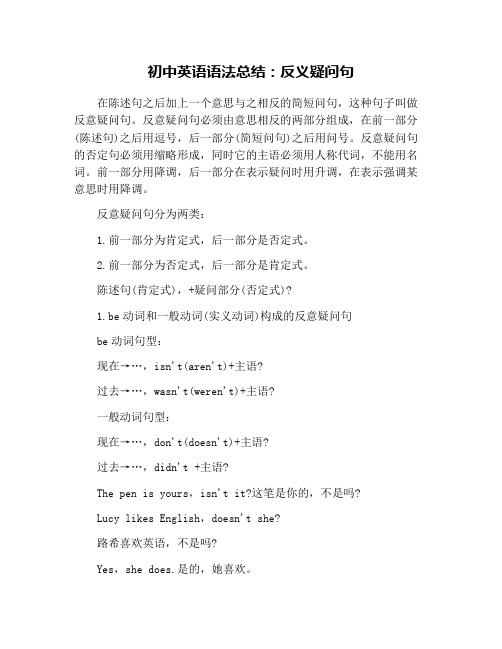
初中英语语法总结:反义疑问句在陈述句之后加上一个意思与之相反的简短问句,这种句子叫做反意疑问句。
反意疑问句必须由意思相反的两部分组成,在前一部分(陈述句)之后用逗号,后一部分(简短问句)之后用问号。
反意疑问句的否定句必须用缩略形成,同时它的主语必须用人称代词,不能用名词。
前一部分用降调,后一部分在表示疑问时用升调,在表示强调某意思时用降调。
反意疑问句分为两类:1.前一部分为肯定式,后一部分是否定式。
2.前一部分为否定式,后一部分是肯定式。
陈述句(肯定式),+疑问部分(否定式)?1.be动词和一般动词(实义动词)构成的反意疑问句be动词句型:现在→…,isn't(aren't)+主语?过去→…,wasn't(weren't)+主语?一般动词句型:现在→…,don't(doesn't)+主语?过去→…,didn't +主语?The pen is yours,isn't it?这笔是你的,不是吗?Lucy likes English,doesn't she?路希喜欢英语,不是吗?Yes,she does.是的,她喜欢。
No,she doesn't.不,她不喜欢。
That was a wonderful night,wasn't it?那是个奇妙的夜晚,不是吗?Yes,it was.是的,它是。
No,it wasn't.不,它不是。
Your sister helped him,didn't she?你姐姐协助了他,不是吗?Yes,she did.是的。
她协助他。
No,she didn't.不。
她没有协助他。
注意反意疑问句中,前后两部分的动词在人称、数和时态上通常保持一致。
另外后一部分的人称代词应和前一部分的主语(名词或代词)保持一致。
Tom is skating,isn't he?(实行时)汤姆在滑冰,不是吗?Yes,he is.是的。
初中英语语法专题专讲--反义疑问句讲解及练习1含答案

反义疑问句【反义疑问句】(一)概念:反意疑问句是由陈述句和附在其后的附加疑问句组成。
其中附加疑问句是对陈述句所说的事实或观点提出疑问,起证实作用,一般用于证实说话者所说的事实或观点。
(二)基本用法要点注意:1、反意疑问句前后两部分谓语应是:“肯定陈述+否定疑问”或“否定陈述+肯定疑问”。
2、简略问句如果是否定式:not应与be,do,will等系动词、助动词、情态动词缩写。
3、简略问句的主语不用名词,应用人称代词。
4、陈述部分含“too...to”时,是否定句。
(三)特殊用法:1) 陈述部分是"there be"结构的,疑问部分用there。
There is something wrong with your watch, isn't there?There will not be any trouble, will there?2)must be 表示“推测”时,疑问部分用isn’t/aren’t+主语(人称代词),不可用“mustn’t”: The bag must be yours, isn’t it?You must be hungry, aren’t you?must 表示“必须”时,疑问部分用needn’t:I must finish my homework today, needn’t I?Mustn’t表示“禁止”时,疑问部分用must.You mustn’t play football in the street, must you?3) a.陈述部分有have/has/had to +v.表“不得不”时,疑问部分常用don't/doesn’t/didn’t +主语。
We have to get there at eight tomorrow, don't we?b.陈述部分have “有”时,疑问句尾可用have,也可用do:She has a new pen, hasn’t/doesn’t she?c. Have表示“吃,喝,玩,度过”等时,疑问句尾用do.They had noodles for lunch, didn’t they?d. Had better 用在陈述部分时,疑问部分用had.You had better finish your homework on time, hadn’t you?e. Have用在完成时中,疑问部分动词用have:She has gone to Beijing with her mother, hasn’t she?4) 陈述部分I am时,疑问部分要用aren't I.I'm as tall as your sister,aren't I?(我和你姐姐一样高,对吗?)5) 陈述部分用no, nothing, nobody, never, few, little, seldom, hardly等否定含义的词时,疑问部分用肯定含义。
反义疑问句
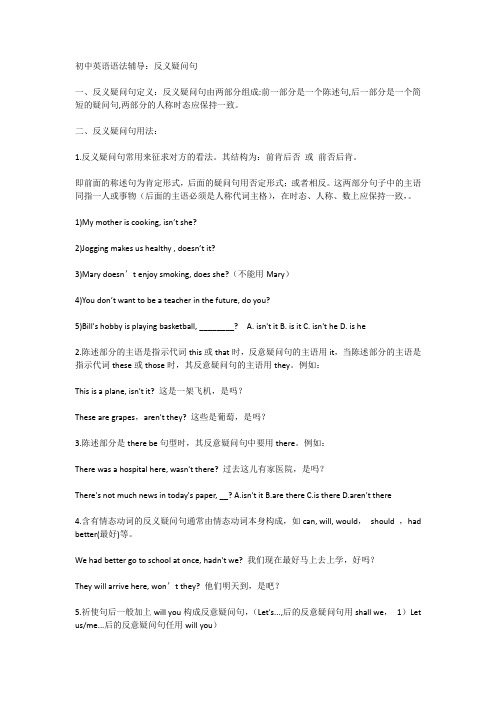
初中英语语法辅导:反义疑问句一、反义疑问句定义:反义疑问句由两部分组成:前一部分是一个陈述句,后一部分是一个简短的疑问句,两部分的人称时态应保持一致。
二、反义疑问句用法:1.反义疑问句常用来征求对方的看法。
其结构为:前肯后否或前否后肯。
即前面的称述句为肯定形式,后面的疑问句用否定形式;或者相反。
这两部分句子中的主语同指一人或事物(后面的主语必须是人称代词主格),在时态、人称、数上应保持一致,。
1)My mother is cooking, isn’t she?2)Jogging makes us healthy , doesn’t it?3)Mary doesn’t enjoy smoking, does she?(不能用Mary)4)You don’t want to be a teacher in the future, do you?5)Bill's hobby is playing basketball, ________? A. isn't it B. is it C. isn't he D. is he2.陈述部分的主语是指示代词this或that时,反意疑问句的主语用it,当陈述部分的主语是指示代词these或those时,其反意疑问句的主语用they。
例如:This is a plane, isn't it? 这是一架飞机,是吗?These are grapes,aren't they? 这些是葡萄,是吗?3.陈述部分是there be句型时,其反意疑问句中要用there。
例如:There was a hospital here, wasn't there? 过去这儿有家医院,是吗?There's not much news in today's paper, __? A.isn't it B.are there C.is there D.aren't there4.含有情态动词的反义疑问句通常由情态动词本身构成,如can, will, would,should ,had better(最好)等。
初中英语语法学习知识点归纳之反义疑问句
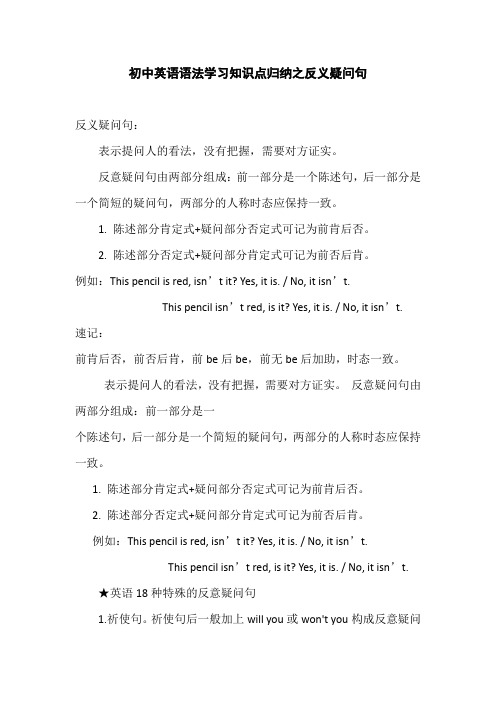
初中英语语法学习知识点归纳之反义疑问句反义疑问句:表示提问人的看法,没有把握,需要对方证实。
反意疑问句由两部分组成:前一部分是一个陈述句,后一部分是一个简短的疑问句,两部分的人称时态应保持一致。
1. 陈述部分肯定式+疑问部分否定式可记为前肯后否。
2. 陈述部分否定式+疑问部分肯定式可记为前否后肯。
例如:This pencil is red, isn’t it? Yes, it is. / No, it isn’t.This pencil isn’t red, is it? Yes, it is. / No, it isn’t.速记:前肯后否,前否后肯,前be后be,前无be后加助,时态一致。
表示提问人的看法,没有把握,需要对方证实。
反意疑问句由两部分组成:前一部分是一个陈述句,后一部分是一个简短的疑问句,两部分的人称时态应保持一致。
1. 陈述部分肯定式+疑问部分否定式可记为前肯后否。
2. 陈述部分否定式+疑问部分肯定式可记为前否后肯。
例如:This pencil is red, isn’t it? Yes, it is. / No, it isn’t.This pencil isn’t red, is it? Yes, it is. / No, it isn’t.★英语18种特殊的反意疑问句1.祈使句。
祈使句后一般加上will you或won't you构成反意疑问句,用will you 多表示“请求”,用won't you 多表示提醒对方注意。
例如:Look at the blackboard, will you/ won't you?看黑板,好吗?Let 引导的祈使句有两种情况:1) Let's...后的反意疑问句用shall we或shan't we。
例如:Let's go home, shall we/ shan't we? 回家吧,好吗?还可以用may I来表示征求对方的同意或许可。
初中英语语法总结反义疑问句
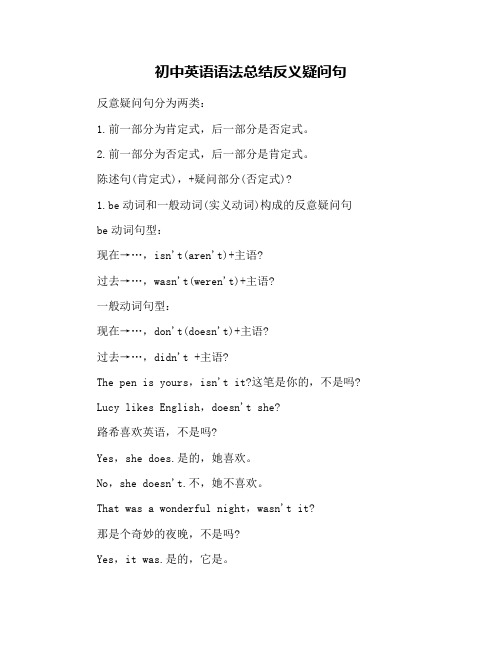
初中英语语法总结反义疑问句反意疑问句分为两类:1.前一部分为肯定式,后一部分是否定式。
2.前一部分为否定式,后一部分是肯定式。
陈述句(肯定式),+疑问部分(否定式)?1.be动词和一般动词(实义动词)构成的反意疑问句be动词句型:现在→…,isn't(aren't)+主语?过去→…,wasn't(weren't)+主语?一般动词句型:现在→…,don't(doesn't)+主语?过去→…,didn't +主语?The pen is yours,isn't it?这笔是你的,不是吗? Lucy likes English,doesn't she?路希喜欢英语,不是吗?Yes,she does.是的,她喜欢。
No,she doesn't.不,她不喜欢。
That was a wonderful night,wasn't it?那是个奇妙的夜晚,不是吗?Yes,it was.是的,它是。
No,it wasn't.不,它不是。
Your sister helped him,didn't she?你姐姐协助了他,不是吗?Yes,she did.是的。
她协助他。
No,she didn't.不。
她没有协助他。
注意反意疑问句中,前后两部分的动词在人称、数和时态上通常保持一致。
另外后一部分的人称代词应和前一部分的主语(名词或代词)保持一致。
Tom is skating,isn't he?(实行时)汤姆在滑冰,不是吗?Yes,he is.是的。
No,he isn't.不。
She is loved by her parents,isn't she?(被动语态)她被她父母亲疼爱着,不是吗?Yes,she is.是的。
No,she isn't.不。
实行时和被动语态的反意疑问句的形式和be动词、一般动词的反意疑问句句型一样。
【初中英语】初中英语语法大全之反意疑问句

【初中英语】初中英语语法大全之反意疑问句
【—之反意疑问句】对于英语中反意疑问句知识内容,希望同学们很好的掌握下面的
讲解。
反义词问题:
反意疑问句表示对陈述句所说的事实提出相反的疑问,要求对方用“yes”或“no”来
进行回答。
1)构成:它由两部分组成:第一部分是陈述句,第二部分是疑问句。
它由be、have、助动词或情态动词+主语组成。
如果陈述句是肯定结构,反义词疑问句必须使用否定结构;如果疑问结构是否定的,则必须使用否定结构,反之亦然。
反义词疑问句的两个部分必须
在人称和时态上保持一致;反义词问题的答案有时与汉语不同。
如:heisold,isn’the?(他老了不是吗?)/themanwentaway,didn’the?(那个男人走
开了不是吗?)/heisn’told,ishe?(他不老是吗?)/heneverwentthere,didhe?(他从没有
去过那里是吗?)
2)对否定问题的答复:
无论哪种形式的反意问句,回答时要遵循:“yes,+肯定式”或者“no,+否定式”
比如:文塔威,不是吗?那人走开了,不是吗
——yes,hedid.(是的,他走了。
)/no,hedidn’t.(不,他没有走。
)
他们都来了,是吗?这个人从不去那里,是吗
——yes,hedid.(不是呀,他去的。
)/no,hedidn’t.(是呀,他不去。
)
我相信以上对英语语法反义词问题的解释和学习能被学生很好地掌握。
我希望学生们
学得好。
初中英语语法之反义疑问句讲解 练习 答案

反义疑问句【反义疑问句】(一)概念:反意疑问句是由陈述句和附在其后的附加疑问句组成。
其中附加疑问句是对陈述句所说的事实或观点提出疑问,起证实作用,一般用于证实说话者所说的事实或观点。
(二)要点注意:1、反意疑问句前后两部分谓语应是:“肯定陈述+否定疑问”或“否定陈述+肯定疑问”。
2、简略问句如果是否定式:not应与be,do,will等系动词、助动词、情态动词缩写。
3、简略问句的主语不用名词,应用人称代词。
4、陈述部分含“too...to”时,是否定句。
(三)用法:1) 陈述部分I am时,疑问部分要用aren't I.I'm as tall as your sister,aren't I?(我和你姐姐一样高,对吗?)2) 陈述部分用no, nothing, nobody, never, few, little, seldom, hardly等否定含义的词时,疑问部分用肯定含义。
如:The old man made no answer, did he?Jim is never late for school, is he?3) 陈述部分有情态动词have to +v. (had to + v.),疑问部分常用don't +主语(didn't +主语)。
We have to get there at eight tomorrow, don't we?used to,疑问部分用didn't +主语或usedn't +主语。
He used to take pictures there, didn't he? / usedn't he?had better(最好)+ v. 疑问句部分用hadn't you?Y ou'd better read it by yourself, hadn't you?4) 陈述部分有would rather(宁可、宁愿)+v.,疑问部分多用wouldn't +主语。
初中反义疑问句详细讲解

反义疑问句一、1、什么是反意疑问句英语中,反意疑问句是由陈述句和附在其后的附加疑问句组成。
其中附加疑问句是对陈述句所说的事实或观点提出疑问,起证实作用,一般用于证实说话者所说的事实或观点。
翻译为“是吗”2.反意疑问句的回答,回答时,如果情况属实,用Yes加上反问句的倒装肯定句;若果情况不属实,则用No加上反问句的倒装否定句。
例如You were moved by your students, weren’t you?情况属实:Yes, I were.情况不属实:No, I weren’t.二、反意疑问句中问句部分的动词与陈述部分的动词在语气上成相反的对应关系,即:肯定+否定?否定+肯定?如:①You can’t do it, can you?你不能做它,是吗?②They are very late for the meeting, aren’t they?他们开会迟到了,是吗?三.当陈述句中含有be动词,助动词,或是情态动词时,反问句部分由这些词加上主语人称代词构成,Be动词包括:am, is, are, was, were助动词有:do, does, did, have(用在完成时), has(用在完成时)等情态动词有:can, could, may, might, must, will, would, shall, should例如:She is a lovely girl, isn’t she?她是一个可爱的女孩,是吗?He will go home, __won’t__ __he__?他要回家了,是吗?She doesn’t l ike to eat popcorn, __does__ _she___?她不喜欢吃爆米花,是吗?The baby won’t sleep early, will it?小宝宝睡得不早,是吗?注意:①He has supper at home every day,doesn’t’t he? (不能用hasn’t he?) 他每天在家吃晚饭,是吗?②They have known the matter, haven’t they? (不能用don’t they?)他们已经知道那事情了,是吗?四.当陈述句中只含有行为动词时,若动词加了s,就用does, 若动词为原形,就用do,动词为过去式,则用did,例如:You cleaned your house last week, _didn’t___ __you__?你上周打扫了你的房间,是吗?Your father plays the computer very well, __doesn’t__ ___he _?你父亲电脑技术很好,是吗?They look so happy today, _don’t ___ _they___?你今天看起来很高兴,是吗?五.反意疑问句的陈述部分带有little, few, never, hardly, seldom,nobody, nothing,barely, scarcely等否定意义的词时,问句部分用肯定式。
2024年初中英语语法一轮复习之反义疑问句用法归纳
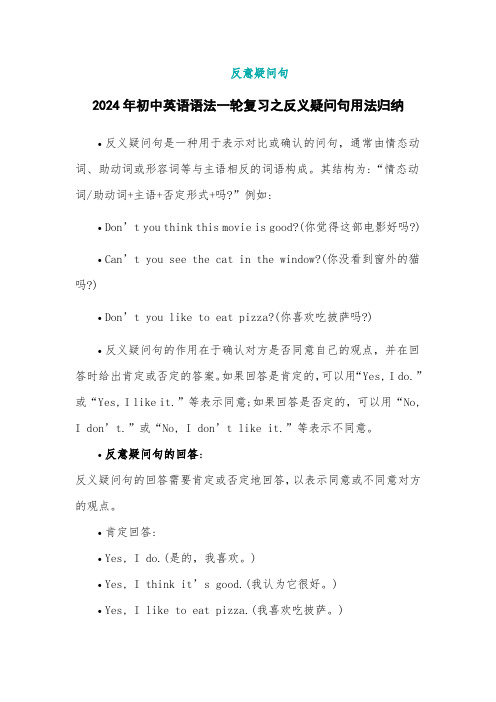
反意疑问句2024年初中英语语法一轮复习之反义疑问句用法归纳•反义疑问句是一种用于表示对比或确认的问句,通常由情态动词、助动词或形容词等与主语相反的词语构成。
其结构为:“情态动词/助动词+主语+否定形式+吗?”例如:•Don’t you think this movie is good?(你觉得这部电影好吗?) •Can’t you see the cat in the window?(你没看到窗外的猫吗?)•Don’t you like to eat pizza?(你喜欢吃披萨吗?)•反义疑问句的作用在于确认对方是否同意自己的观点,并在回答时给出肯定或否定的答案。
如果回答是肯定的,可以用“Yes, I do.”或“Yes, I like it.”等表示同意;如果回答是否定的,可以用“No, I don’t.”或“No, I don’t like it.”等表示不同意。
•反意疑问句的回答:反义疑问句的回答需要肯定或否定地回答,以表示同意或不同意对方的观点。
•肯定回答:•Yes, I do.(是的,我喜欢。
)•Yes, I think it’s good.(我认为它很好。
)•Yes, I like to eat pizza.(我喜欢吃披萨。
)•否定回答:•No, I don’t.(不,我不喜欢。
)•No, I don’t think it’s good.(不,我觉得它不好。
)•No, I don’t like to eat pizza.(不,我不喜欢吃披萨。
) •需要注意的是,在回答反义疑问句时,应该使用正确的语法和标点符号,以确保回答的准确性和清晰度。
回答反义疑问句的原则回答反义疑问句的原则是:肯定回答用“Yes, I do.”或“Yes, I think it’s good.”等表示同意;否定回答用“No, I don’t.”或“No, I don’t think it’s good.”等表示不同意。
初中英语语法_反意疑问句

初中英语语法反意疑问句反意疑问句是由两部分组成的,前一部分是对事物的陈述(即陈述句),后一部分是简短的提问(即简短疑问句),中间用逗号隔开。
如果前一部分用肯定句,后一部分就用否定疑问句;如果前一部分用否定句,后一部分就用肯定疑问句。
两部分的人称和时态要一致。
其回答是用yes 或no 来表示。
一、含be(is, are, was, were)动词的反意疑问句,需用b e的适当形式.①Y ou are from America, aren't you? Y es, I am. No, I'm not.②The Green weren't at home last night, were they? Y es, they were. No, they weren’t.注意:1、陈述部分主、谓语是I am...时,反意疑问句用aren't I 或ain't I ,而不是am not I (可用am I not)。
例如:I'm working now, aren’t I? 我在工作,是吗?二、行为动词的一般现在时的反意疑问句,需用do/does的适当形式。
①Y ou often watch TV in the evening, don't you? Y es, I do. No, I don't.②The first class begins at eight, doesn't it? Y es, it does. No, it doesn't.三、行为动词的一般过去时的反意疑问句,需用did的是适当形式。
①The rain stopped, didn't it? Y es, it did. No, it didn't.②Jim’s parents didn't go to Hong Kong last month, did they? Y es, they did. No, they didn't.四、一般将来时的反意疑问句,需用will的适当形式。
【英语】初中英语反义疑问句详细讲解整合
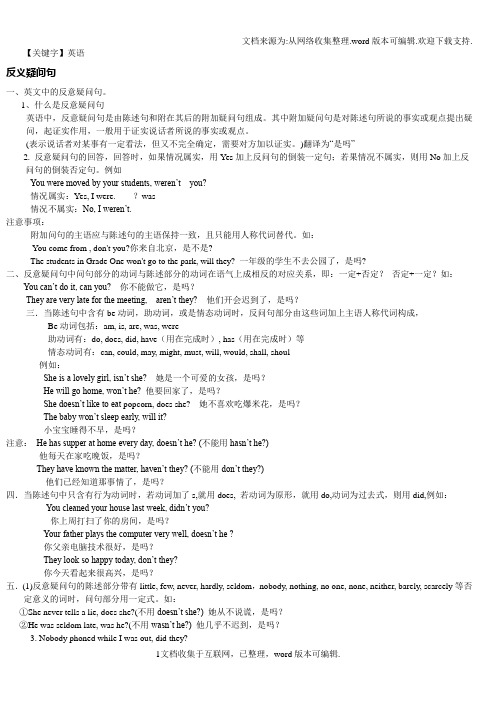
【关键字】英语反义疑问句一、英文中的反意疑问句。
1、什么是反意疑问句英语中,反意疑问句是由陈述句和附在其后的附加疑问句组成。
其中附加疑问句是对陈述句所说的事实或观点提出疑问,起证实作用,一般用于证实说话者所说的事实或观点。
(表示说话者对某事有一定看法,但又不完全确定,需要对方加以证实。
)翻译为“是吗”2. 反意疑问句的回答,回答时,如果情况属实,用Yes加上反问句的倒装一定句;若果情况不属实,则用No加上反问句的倒装否定句。
例如You were moved by your students, weren’t you?情况属实:Yes, I were. ?was情况不属实:No, I weren’t.注意事项:附加问句的主语应与陈述句的主语保持一致,且只能用人称代词替代。
如:You come from , don't you?你来自北京,是不是?The students in Grade One won't go to the park, will they? 一年级的学生不去公园了,是吗?二、反意疑问句中问句部分的动词与陈述部分的动词在语气上成相反的对应关系,即:一定+否定?否定+一定?如:You can’t do it, can you? 你不能做它,是吗?They are very late for the meeting, aren’t they? 他们开会迟到了,是吗?三.当陈述句中含有be动词,助动词,或是情态动词时,反问句部分由这些词加上主语人称代词构成,Be动词包括:am, is, are, was, were助动词有:do, does, did, have(用在完成时), has(用在完成时)等情态动词有:can, could, may, might, must, will, would, shall, shoul例如:She is a lovely girl, isn’t she? 她是一个可爱的女孩,是吗?He will go home, won’t he? 他要回家了,是吗?She doesn’t like to eat popcorn, does she? 她不喜欢吃爆米花,是吗?The baby won’t sleep early, will it?小宝宝睡得不早,是吗?注意:He has supper at home every day, doesn’t he? (不能用hasn’t he?)他每天在家吃晚饭,是吗?They have known the matter, haven’t they? (不能用don’t they?)他们已经知道那事情了,是吗?四.当陈述句中只含有行为动词时,若动词加了s,就用does, 若动词为原形,就用do,动词为过去式,则用did,例如:You cleaned your house last week, didn’t you?你上周打扫了你的房间,是吗?Your father plays the computer very well, doesn’t he ?你父亲电脑技术很好,是吗?They look so happy today, don’t they?你今天看起来很高兴,是吗?五.(1)反意疑问句的陈述部分带有little, few, never, hardly, seldom,nobody, nothing, no one, none, neither, barely, scarcely等否定意义的词时,问句部分用一定式。
- 1、下载文档前请自行甄别文档内容的完整性,平台不提供额外的编辑、内容补充、找答案等附加服务。
- 2、"仅部分预览"的文档,不可在线预览部分如存在完整性等问题,可反馈申请退款(可完整预览的文档不适用该条件!)。
- 3、如文档侵犯您的权益,请联系客服反馈,我们会尽快为您处理(人工客服工作时间:9:00-18:30)。
初中英语语法之反义疑问句注意一、反义疑问句是疑问句的一种,它对陈述部分的事实提出相反的疑问,形式上是一个省略问句,附加在陈述句后,即:陈述句+ 逗号+ 省略问句+ 问号You are from America, aren’t you?注意二、遵循前否定后肯定或前肯定后否定的原则(但在祈使句等一些特殊句子中需注意,详细见注意七)Jim isn’t in Class Four, is he?注意三、附加疑问句必须前后两句主语相同Mr Zhang has been here for four years, hasn’t he?注意四、附加疑问句部分与主语不一致的若干情况如下(需牢记)1.this 或that改it,无论是否指人This is your brother, isn’t it?2. these或those改theyThose are books ,aren’t they?3. 不定代词one改one或heOne can’t be always young, can one / he?4. something、anything、everything和nothing改itNothing is serious, is it? (注意为什么后面用is it而不是isn’t it?)Everything seems all right, doesn’t it?5. everybody、everyone、somebody、someone、anybody、anyone、nobody 改they或he(任选,但选定后注意单复数形式)Everyone knows this, don’t they / doesn’t he?Nobody likes to lose money, does he? (这里最好用he)6.each of改he或theyEach of the boys had an apple, didn’t he / they?7. no one, none, neither, either改they 或heNo one came, did they?8. some of…、none of …改it、they或you(联系上下文或句子)None of the food was delicious, was it?Some of the dustmen have come back, haven’t they?9. 由neither…nor…、not only…but also、both…and…、either…or…、not…but…、…or…、…and…等连接的并列主语,改复数代词Neither you nor I am wrong, are we?Both Tom and Jack came, didn’t they?10. 由动词不定式、动名词、从句或词组构成的主语,改itTo learn English well isn’t easy, is it?Swimming is great fun, isn’t it?11. the + 形容词表示一类人,改复数代词The poor had no right (权力) to speak at the time, did they?12. there 引起的句子(There be句型等),仍用thereThere stands a house and a lot of trees, doesn’t t here?There are many children in the park, aren’t there?注意五、附加疑问句部分与谓语不一致的若干情况如下(需牢记)(初中阶段14点18点和19点可以常识性了解)1. have (有)改have或doMary has two brothers, doesn’t she / hasn’t she?2. have (有)必须与陈述部分一致He hasn’t a lot of time, has he?Miss Green doesn’t have any money in her pocket, does she?3. have不做“有”解释,必须用doThey all have a good time, don’t they?4. have to用do或haveWe have to get up early, don’t we / haven’t we?5. have got to用haveWe have got to answer all the questions, haven’t we?6. had better用should或hadWe had better go right now, shouldn’t we / hadn’t we?7. can’t(不可能,表示推测)根据can’t或的动词选择相应的形式He can’t be a doctor, is he?The workers can’t have finished their work, have they?8. may 用may + 主语+ not (英语中不用mayn’t)They may be here next week, may they not?9. must(必须)用needn’tYou must do it today, needn’t you?10. must(应该)用mustn’tI must study hard, mustn’t I?11. mustn’t用must或mayYou mustn’t talk like that, must you?We mustn’t stay here any longer, must we?12. “must be”对现在情况进行推测作一般现在时或现在进行时的附加疑问句进行处理2 反义疑问句He must be happy, isn’t he?He must be working hard at the office, isn’t he?must表示推测时,也有用mustn’t的He must have been working very hard, mustn’t he?You must have told Mr Wang the secret, mustn’t you?13. “must+ 完成时”表示对过去情况的推测,作一般过去时附加疑问句处理He must have come yesterday, didn’t he?You must have seen the play last week, didn’t you?14. “must+ 完成时”用来推测过去的动作持续到现在按现在完成时的附加疑问句来处理You must have studied English for years, haven’t you ?He must have lived here for at least ten years, hasn’t he?14. 实义动词need和dear用doHe needs help, doesn’t he?I have never dared to ask him, have I?15. 情态动词need和dear用need和dearHe dare not say so, dare he?We need not do it again, need we?16. needn’t用need或mustYou needn’t go yet, need you?He needn’t do that, must he?17. “would rather + 动词原形”和“would like to + 动词原形”用wouldn’tHe would rather read the text ten times than recite it, wouldn’t he?You’d like to have some bananas, wouldn’t you?18. “ou ght to + 动词原形”用oughtn’t或shouldn’tThe child ought to be punished, oughtn’t he?We ought to go there, shouldn’t we?19. “used to + 动词原形”用“didn’t+ 主语”或“usedn’t+ 主语”或“used+ 主语+ not”He used to live in London, usedn’t he / didn’t he?He used to play football when he was a child , used h e not?注意六、句子中有seldom, hardly, no, not, never, few, little, nothing, nobody, nowhere等是否定句,附加疑问部分必须采用肯定形式Nobody phoned while I was out, did they?He is hardly able to swim, is he?There is little ink in your pen, is there?no one, nobody, none, nothing, neither等作动词的宾语时,附加疑问部分一般采用肯定形式(也偶尔用否定形式)He has nothing to say, does(n’t)he?You got nothing from him, did(n’t)you?注意七、一些特殊句型的附加疑问句1. I am…改aren’t II am your friend, aren’t I?2. I wish to do sth或I wish I …改may II wish to go home, may I?I wish I were you, may I?3. 主从复合句,与主句的主谓语保持一致He says that I did it, doesn’t he?David wouldn’t go there if it rained, would he?4. 并列句,与邻近的分句保持一致Mary is a nice girl, but she had one short-coming, hadn’t she?5. 表示邀请,请求的祈使句,附加疑问部分用will you或won’t you或would you等,一般只要记住will you就可以了,不遵循前否定后肯定或前肯定后否定的原则Come here, will you?Turn off the light, will you?Do sit down, will you?6. 表示告诉别人做某事的祈使句,用will you、can you、would you 或can’t you、won’t youStop talking, can you?Write down the new words, will you / won’t you?7. 否定的祈使句用will you或can youDon’t make a noise, will / can you?8. Let me …用will you 或may ILet me help you, may I?Let me do it, will you?9. Let’s…表示建议包括听话人在内,用shall weLet’s go for a walk, shall we?10. let us …表示允许,不包括听话人在内,用will youLet us do it by ourselves, will you?11. Let接第三人称宾语时用will youLet him come in, will you?12. Let’s not …用OK或all rightLet’s not go to the party, OK / all right?13. 感叹句用一般现在时be的形式(故事中用一般过去时be的形式)What fine weather, isn’t it?How clever the boy is, isn’t he?How hard she works, isn’t she?反义疑问句练习题目:1. Linda ate nothing this morning, ___?A. didn’t sheB. was sheC. did sheD. wasn’t she2. There’s hardly___ milk in the bottle, _____there?A. no, isn’tB. some, isC. little, isn’tD. any, is3. He has never ridden a horse before, ___?A. does heB. has heC. hasn’t heD. doesn’t he4. —He seldom came here, _____?—Yes sir.A. didn’t heB. does heC. d oesn’t heD. did he5. Everything seems all right, _____ ?A. does itB. don’t theyC. won’t itD. doesn’t it7. One can’t be too modest, can _____ ?A. oneB. heC. itD. we8. No one failed in the exam, _____ ?A. was heB. did oneC. did theyD. d idn’t he10. Neither you nor I am a artist, _____ ?A. am IB. aren’t weC. are weD. ain’t I11. He can’t be her father, _____ he?A. isB. isn’tC. canD. can’t12. They have no time to visit the museum, _____?A. do theyB. haven’t theyC. don’t theyD. will the y14. You’d better go at once, _____ you?A. hadn’tB. didC. didn’tD. don’t15. You’d rather work than play, _____ you?A. hadn’tB. wouldn’tC. didn’tD. mustn’t16. You dare not do that, _____ you?A. don’tB. doC. dareD. daren’t18. He dislikes the two subjects, _____ he?A. doesB. doesn’tC. isD. isn’t19. These tools are useless now, _____ ?A. are theyB. aren’t theyC. is itD. isn’t it20. He used to get up at 6:30, _____ he?A. didn’t heB. did heC. used heD. woul dn’t he22. He ought to win the first prize, _______ he?A. mustn’tB. oughtn’tC. shouldn’tD. Both B and C.23. Let’s go there by bus, ___?A. will youB. shall weC. don’t youD. will you24. Let us go to play football, ___?A. will youB. shall weC. do weD. are we25. Don’t forget to give Polly some food and change he r water, ___?A. will youB. shall weC. won’t youD. do you26. —Let’s go shopping this afternoon, _____?—All right.A. will weB. shall weC. don’t weD. are we27. —Pass me the dictionary, _____?—Yes, with pleasure.A. would youB. will youC. won’t youD. wouldn’t yo u30. There is little water in the glass, ____?A. isn’t thereB. isn’t itC. is itD. is there32. There won’t be any concert this Saturday evening, _ ____ ?A. will there notB. will thereC. is thereD. won’t33. —I guess she taught herself Japanese, ______?—Yes.A. don’t IB. did sheC. do ID. didn’t she34. I don’t believe you are right, _____ ?A. are youB. do youC. won’t youD. do35. She doesn’t think that Tom sings best in the class, _____ ?A. does sheB. doesn’t sheC. does heD. doesn’t he37. I know you didn’t want to hurt me, _____ ?A. did youB. didn’t youC. do ID. don’t I38. If my father were here,he would be very happy, _ ____ ?A. weren’t heB. were heC. wouldn’t heD. would heKey: 1—5 CDBDD 6—10 BACDC 11—15 AABAB 16—20 CCBBA 21—25CDBAA 26—30 BBBAD 31—35 BBDAA 36—38 AAC。
